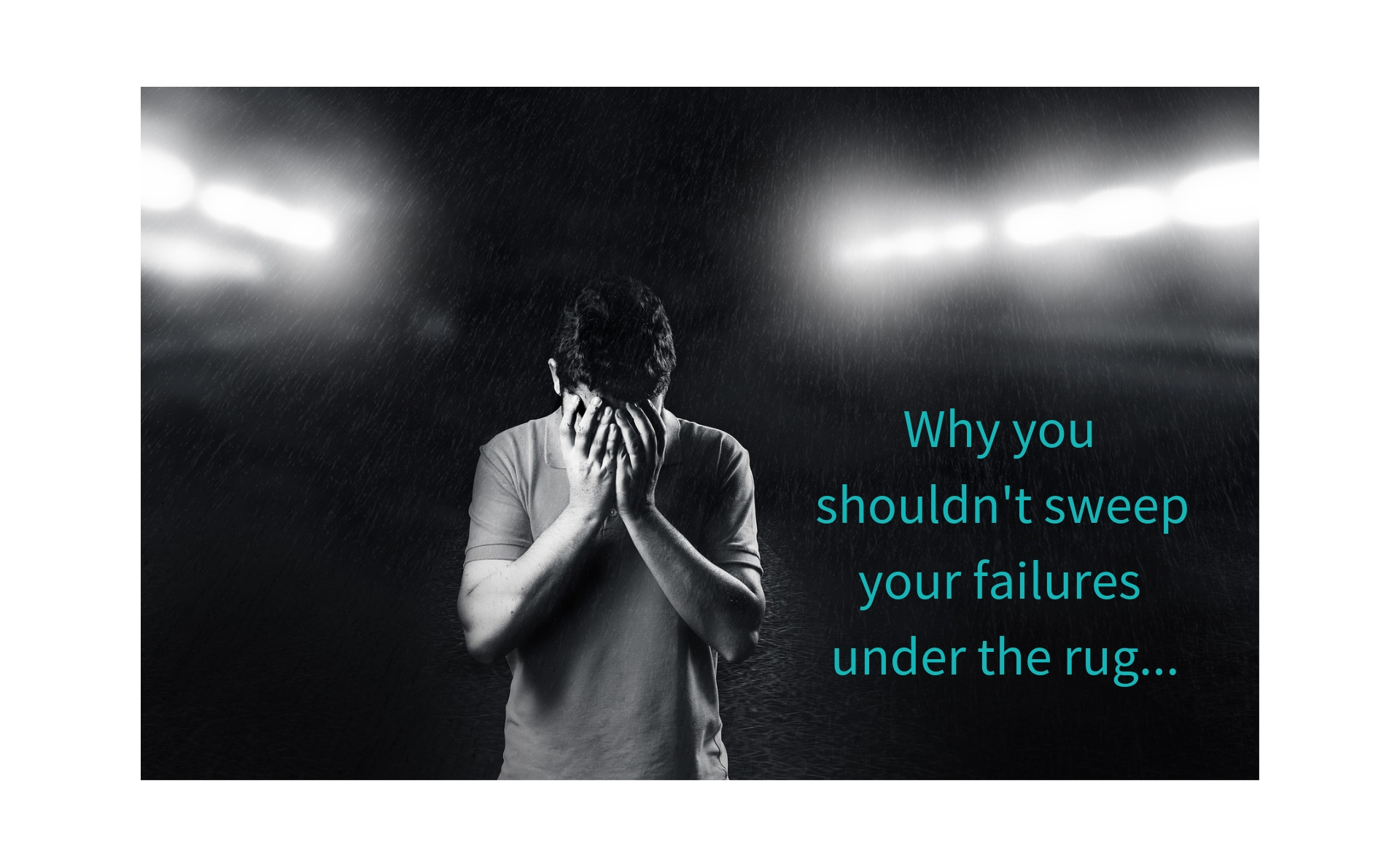All of us fail at something, at some point in life. Failure in life IS INEVITABLE. From home improvement projects that go totally wrong, or exams that you don’t pass, to marriages that terminate in divorce and businesses that end in bankruptcy. To fail is painful and often embarrassing. But here’s why I say you shouldn’t sweep your failures under the rug: failure is the key to future success, or at least to some much-needed learning about life and how to survive it.
Without failures we have less to learn from in life. I propose you look at failures as something useful, events and experiences that, if faced up to, and worked through, enable us to be more successful in the future.
Perhaps you’re thinking, “oh but you haven’t had the failures I have… “.
But I HAVE failed, big time.
I used to have a very comfortable life: a lovely home, lots of time and space for my interests, a couple of apartments that I rented out which gave me an income, and NO DEBT. Not even a mortgage or a credit card bill. I wasn’t wildly rich, but I was contented. There was enough to pay the bills, fund my many hobbies, and keep my animals happily fed.
Then about 5 years ago, it all changed. The man I had married a couple of years before, an entrepreneur, proposed a new business. Trusting in him and his business acumen completely, I sold my properties to fund the business, keeping his place as a base. The plan was for me to put the capital in, and he would manage the business, leaving me free to continue with my lifestyle.
Well as you’re probably imagining, the business was not successful, some poor management decisions were made and I was obliged to leave my very relaxed lifestyle to start working in the business. My husband and I disagreed about many things, and I almost always deferred to his ‘superior’ experience. That was one of my principal mistakes, one that I repeated over and over. It was hard for me to find my own voice in a new arena, and have the confidence to be heard.

But I worked like a dog to try to save the business. I ignored the ongoing signs of stress: massively high cholesterol; a mouth guard to stop me losing any more tooth enamel due to grinding my teeth even when awake, and a constant short-fuse.
Furthermore, external political and economic factors complicated our progress. These, along with our very poor decision-making, eventually resulted in a bankrupt business, thousands of pounds of debt and a very unhappy marriage.
My health worsened and I collapsed after losing consciousness and ended up in hospital. I had lost everything. I felt like such a failure. After working so hard to try to turn it all around, I drove myself into burnout. Despite all my best efforts, I hadn’t been able to make it work.
Ever tried. Ever failed. No matter. Try again. Fail again. Fail better.
(Samuel Beckett)
It’s tough admitting defeat and facing your failures, but it’s tougher if you don’t admit it and blithely continue bashing your head against the wall in a pointless effort to ignore the obvious.
So I finally accepted that it was over. When you lose everything, there is a strange calmness that comes over you. You stop fighting to keep something alive, and your energy can be more productively used to move forward.
And I had indeed lost everything, but I didn’t want to think I had NOTHING to show for it. After several years of experience (of f*ck-ups and folly), I had plenty of things to examine and learn from. I was determined to get from those experiences any nugget of wisdom that I could apply to my future. I had an intense desire to show MYSELF that I could pick myself up and start again, but more capable, independent and aware this time.
Failure rarely occurs overnight
Failure is rarely an overnight phenomenon, but rather, the consequence of several errors made over time. Take my failed business for instance: in trying to understand why it failed, I had to examine the various mistakes and miss-steps along the way. Each one was a cold and lonely bus stop on a bumpy road trip to the final destination of ‘Bankruptcy’.
I could have got off the bus, crossed the road and gone back to fix the problem, but I didn’t. Or I could have just stopped the bus, recognising that it was a road to nowhere, and do something else. But I didn’t. I just kept going. I kept pushing on in the journey, optimistically thinking that sheer hard work and determinacy would win the day. All I achieved was making myself ill from the constant stress and pressure that I was putting myself under.
On top of the mistakes made in the business, I made others in not looking after myself. I didn’t practice self-care. I stopped going out (can’t afford it), stopped seeing friends (how will I pretend everything is OK?), and worked so many hours every day that I had no time to go to the gym to do yoga and use the sauna (2 things that really help me relax). And because of the tension, I found myself permanently angry. I was constantly shouting at my lovely dogs instead of playing with them, which would have helped me feel less stressed.
The problem with failure is that it stops you from doing things.
The fear of failing – the belief that you can’t achieve success, a fear of messing up, of it all going wrong, of looking like an idiot – stops you taking risks and so you do nothing.
But take comfort in something important: without failure, success is difficult to achieve. Think of a kid learning to ride a bike – how many times will s/he fall off? Too many to count. But each time that brave little rider gets back on the bike, s/he has learned from the previous fall. Eventually, it’s as easy as… riding a bike.
The sad thing is, as adults we no longer view life as learning to ride a bike. Instead of getting back on, we hide the bike at the back of the garage and pretend we never had one.
Or we don’t even hide it away in the garage, we stay lying on the ground, where we fell off, and see ourselves as incapable losers for the rest of our lives.
Failure feels horrible. It’s sometimes scary, and certainly embarrassing, but if we can start to see failure as an important opportunity for learning, it makes the negative consequences easier to manage. From that very learning, by dissecting and analysing our failures, we are more likely to achieve success in the future. We all fail, but it’s what we do with that experience of failure that really matters, our perception of it and response to it.
Once the whole ugly result of my failure was stretched out behind me, I started to break it down into its smaller steps – the mistakes that it was comprised of – in order to understand it better. I realized that all the negative disappointment I had towards myself for failing was unhealthy, and wasn’t helping me get out of my rut. I had to reframe those errors as a process of personal growth and development, ultimately helping me to become a stronger and more able person. In this way I could appreciate those painful experiences as a means of continuously improving myself.
There are some very useful personal qualities and traits that we can develop as a result of failure.
Let’s start with resilience. Resilience is my favourite word for this year. Without resilience we don’t pick ourselves up after each setback, or each time we fall off the bike. We don’t dust ourselves off and carry on. Given that failure in life is inevitable at some point, this ability to bounce back is invaluable. I know that when I fall, I will be able to get up and get back out there.
Perception. When we’re in the middle of a mess, it’s often hard to see outside of it, or to see it in a different light. Positive affirmations aren’t for everyone, but allowing yourself to get bogged down in negativity cannot possibly improve the situation. Rename your failures: see them as efforts, or experiments. Make them useful experiences.
Looking at the failure as an indication of what can be improved upon and learned from is much healthier than beating yourself up for having failed in the first place. Think about it: if you don’t change your mindset to be more positive, the negative aspects will bring you down further. Change your perception. See things differently. As Richard Branson said:
“Today’s failure can lead to tomorrow’s success”
Richard Branson
Humility: Failure is a painful lesson, one that can shame us and stays with us more powerfully than our successes. It hurts our pride to admit failure, which is why so many of us, me included, find denial easier. But when we stop hiding from our own failures, we can start to learn and grow from them.
Self-care: Don’t stop doing the things that keep you sane and happy. They are essential. Find someone to help you through it. Try to reach out to someone to talk to, really talk. Whilst sometimes having a cup of tea with a friend can help, when you’re really trapped by your mistakes search out someone who can gently question with you what you’re doing, who will caringly help hold you accountable and find a way to move on.
Integrity: I contributed to my failure and I needed to own that. And that made it easier for me to critically assess what went wrong, honestly. Admitting this allows me to move forward
So yes, failure at some point in life is inevitable, but try turning it around. Say instead, My SUCCESS is INEVITABLE. I will learn from any mistakes and use them to inform my future decision-making.
In his book ‘Failing Forward’, the author John C. Maxwell has a lovely acronym for MISTAKES that helps us to see mistakes, and therefore failure, as a positive experience:
- Messages that give us feedback about life
- Interruptions that should cause us to reflect and think
- Signposts that direct us to the right path
- Tests that push us toward greater maturity
- Awakenings that keep us in the game mentally
- Keys that we can use to unlock the next door of opportunity
- Explorations that let us journey where we’ve never been before
- Statements about our development and progress
Reframe your failures in life. See failure as the key to success. Even the process of writing this article has helped me look back at my many mess-ups and see them in a more positive light. Instead of hiding them away so I can’t be reminded about them, I have laid them bare, to get from them all the possible learning that I can. I might not repeat the same mistakes in the future: for sure, I will make others. And I will learn from those too, so that they contribute to my future successes.
I’m not suggesting that recovery from failure is an overnight process: it takes guts, and I’m still working on it (read more about that here).
If YOU feel that you really don’t know how to cope with what you are going through in life, reach out to someone, please. Be it a friend, family member or your doctor… If you don’t feel that you can turn to someone you know, there are organisations that are there to assist you. Here in the UK the Samaritans have helplines and offices where you will be very welcomely received. This is their website. Don’t suffer in silence.

